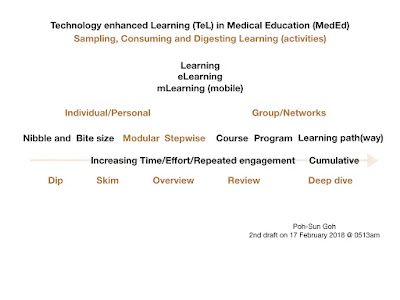Goh PS, Sandars J. (2019). Digital Scholarship – rethinking educational scholarship in the digital world, MedEdPublish, 8, [2], 15, https://doi.org/10.15694/mep.2019.000085.1
Samarasekera DD, Goh PS, Lee SS, Gwee MCE. The clarion call for a third wave in medical education to optimize healthcare in the twenty-first century. Medical Teacher (accepted for publication, July 2018; epub 9 October 2018).
(see section on Learning Analytics and Digital Scholarship within article)
Goh, P.S. Learning Analytics in Medical Education. MedEdPublish. 2017 Apr; 6(2), Paper No:5. Epub 2017 Apr 4. https://doi.org/10.15694/mep.2017.000067
Goh, P.S., Sandars, J. Insights from the culinary arts for medical educators. MedEdPublish. 2017 Jan; 6(1), Paper No:10. Epub 2017 Jan 18.
Goh, P.S. eLearning or Technology enhanced learning in medical education - Hope, not Hype. Med Teach. 2016 Sep; 38(9): 957-958, Epub 2016 Mar 16
Goh, P.S. Using a blog as an integrated eLearning tool and platform. Med Teach. 2016 Jun;38(6):628-9. Epub 2015 Nov 11.
above from
Goh, P.S. Learning Analytics in Medical Education. MedEdPublish. 2017 Apr; 6(2), Paper No:5. Epub 2017 Apr 4. https://doi.org/10.15694/mep.2017.000067
Privacy. Data Security. Responsible Access/Use. Awareness. Digital literacy. Thoughtful use. Confidence. Public networks and platforms + "Free" commercial/ad driven networks and platforms vs Private/Institutional Intranets and Learning Management Systems
What are some of the key requirements necessary to take full advantage of an eLearning/Technology enhanced learning platform and process?
How can we take advantage of the flexibility, low cost (often "free"), scale and reach of public networks and platforms (for example Instagram, WhatsApp, WeChat, Facebook, Blogger, LinkedIn), and combine this with the greater privacy, rule based use and governance of private (password, dual-key, biometric secured) and institutional networks, which are still potentially vulnerable to potential data breeches, data misuse, hacking, and data loss/theft?
Do we respond by not participating? or restricted/limited participation? creating silos, both online, and some off-line? Not using digital formats? Going offline?
I believe one sensible, and safe approach is to combine, or blend the use of fully public, semi-private, and private digital platforms and approaches, some off-line, some online.
We can learn from our current cautious, and informed use of digital medical records by our healthcare systems; and translate strategies and approaches to the use of student and trainee records and data (learning and training logs, data streams and artefacts). We can also learn from financial practice and the finance industry, in their use of encryption and blockchain for example, at an institutional and system level."
above from
https://medicaleducationelearning.blogspot.sg/2017/10/requirements-for-data-informed-personal.html
above from
https://medicaleducationelearning.blogspot.sg/2017/10/requirements-for-data-informed-personal.html
above from
(as of 18 October 2017 @ 1019am)
____________
https://mededworld.org/hardens-blog/reflection-items/December-2017/HARDEN-S-BLOG-Manila-and-Macau--Next-generation-eL.aspx
____________
____________
Instagram stream (below) as hyperlinked, online-mobile accessible, interactive SlideDeck
above and below from
above from
above from
above and below from

above from
above from
above from
above from
above from
Concrete examples data informing teaching and learning from Poh-Sun Goh
above from
and
above also at
above from
and
above from
Digital Scholarship from Poh-Sun Goh
https://www.facultyfocus.com/articles/faculty-development/how-teaching-can-inform-scholarship/
https://www.facultyfocus.com/articles/faculty-development/how-teaching-can-inform-scholarship/
Instagram - for grabbing attention, showing value
Slideshare - for access, analytics (views, downloads, clipping)
Blogger - for access, analytics, as digital repository
Goh, P.S. Using a blog as an integrated eLearning tool and platform. Med Teach. 2016 Jun;38(6):628-9. Epub 2015 Nov 11.
Padlet - as online bulletin board, for access
Goh, P.S., Sandars, J. An innovative approach to digitally flip the classroom by using an online "graffiti wall" with a blog. Med Teach. 2016 Aug;38(8):858. Epub 2016 Jul 14.
click on tile above to access website





















































